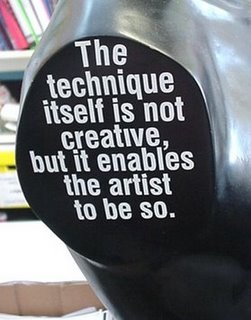
 As I visit schools I see the effects of heavy interventionist 'training' programmes – usually in the literacy and numeracy fields, that are being ‘delivered’ to school through contracts.
As I visit schools I see the effects of heavy interventionist 'training' programmes – usually in the literacy and numeracy fields, that are being ‘delivered’ to school through contracts.They all seem heavily biased towards ‘best evidenced’ and ‘well researched’ processes, procedures and techniques and, as a result, can hardly be called creative.
There seems an obsession with winning the ‘achievement ‘stakes – internationally, or year by year in every school. Teachers pore over variances in achievement with the intensity of voodoo priests staring at chicken bones.
There is no doubt that the heavily interventionalist ‘training’ programmes in literacy and numeracy are making a difference but at the cost of teacher creativity - the ‘life blood’ of real progress in any area of learning. The pressure/support schools receive ensure that ‘target setting’ (another imported technocratic ‘voodoo’ idea) is narrowly restricted to literacy and numeracy.
As a result, as one UK commentator says, ‘The evil twins of literacy and numeracy have all but gobbled up the entire curriculum.’ This has resulted in a lessoning of emphasis on creative learning in a range of areas.
As well, research is showing that although there have been impressive achievement gains these cannot be sustained and they eventually plateau out and trend down. This is being interpreted as the result of a real lack of 'ownership' of the process by teachers and the effects of growing feelings of dependency on outside providers. Teachers, by applying this well researched ‘one size fits all model, are becoming intelligent technicians.
I guess if there are good things about the imposed ‘efficiency’ and highly monitored programmes it has been that teachers are now talking more about teaching and sharing ideas so all is not lost! It is within this collegial sharing that future developments ought to lie.
A look around many classrooms with a ‘creative eye’ illustrates this heavy handed approach of imposed processes, pre set criteria, intentions, and exemplars. The students work on display, including of all things art, has the look of a high level of mediocrity.
Inadvertently what is being demeaned is the creative power of each teacher, particularly of the few really creative teachers who still exist in the bland managerial environment created in the past decades.
Let’s hope that an understanding develops that it is the wisdom lying untapped with the teachers themselves that is where real educational change resides.
Creative teachers have one obsession that protects them from 'managerialism'. They are passionate about developing the talents, passions, interests and dreams of the students rather than implementing, or ‘delivering’, curriculum guidelines. Because they understand the creative process ( which is often messy and always unpredictable) they gain their satisfaction, not in achieving set targets, but in the idiosyncratic thinking, language and creative expression of their students. Creative teachers are not distracted by their students having to achieve preset achievement goals but are energised by being continually surprised by the creativity of their students.
Creative differences are what we should be aiming for (along with agreed ‘foundation skills’) in our classrooms and schools
The skill of teachers (and school leaders) ought to lie in creating the conditions to develop the creativity and talents of all students. They need to be skilled in assisting students to generate ideas, to provide help in realizing such ideas (but with a ‘light’ hand) and by challenging each individual student to continually reach for personal excellence.
Excellence, it is said, is a journey not a destination. Creative exellence is hard to measure but easy to see or experience – it is the opposite to the dull conformity (called 'high achievement standards') so loved by technocrats.
Creativity must always be more than technique.
And if we want to be a creative country it is the most important educational quality of all to be nurtured in our students, teachers and schools.
5 comments:
Imposed training approaches will always result in mediocrity and, as you say, while there are short term gains there are also losses in individual teachers' sense of agency.
Creative teachers that have survived had had to go underground the past decade or so. Doing their best to comply with often senseless requirements while still focusing on helping each learner in their class be all they can be. Not easy work. Let's hope, with the Minister's attraction to 'personalised' learning, creative teachers will once again lead the charge to improving learning.
One thing you can guarantee - the 'experts' ( people who copy others mistakes) always end up being wrong, even if what they do makes sense at the time.There are always consequences they can never imagine. It is better to tap into the 'messy' diversity of creative teachers for ideas but this would never suit the tidy 'technorats'.
This is interesting. I (with a collegue) started a chess program across a cluster of 13 schools. There were many things we aimed to do. It aimed to develop a 'culture of chess' across a rural shire. We wanted to bring a community organisation (local chess club) into classrooms sharing expertise. We wanted to make chess 'cool'. We wanted to kids and family to become a part of chess culture we hadn't yet created. And we wanted to promote fun and enjoyment through game-playing. All things, we think, are important outcomes in education.
BUT, in order to sell it and get local funding, we had to call it a NUMERACY project, cross-referenced to National Benchmarks.
Interesting.
This trying to tie everything to literacy and numeracy is demeaning to the true pursuit of learning but it is what the system's technocrats encourages schools to do.
The idea of working across schools, and involving students and their families, ought to be enough by themselves - and surely chess itself encourages strategic or logical thinking skills.
Post a Comment